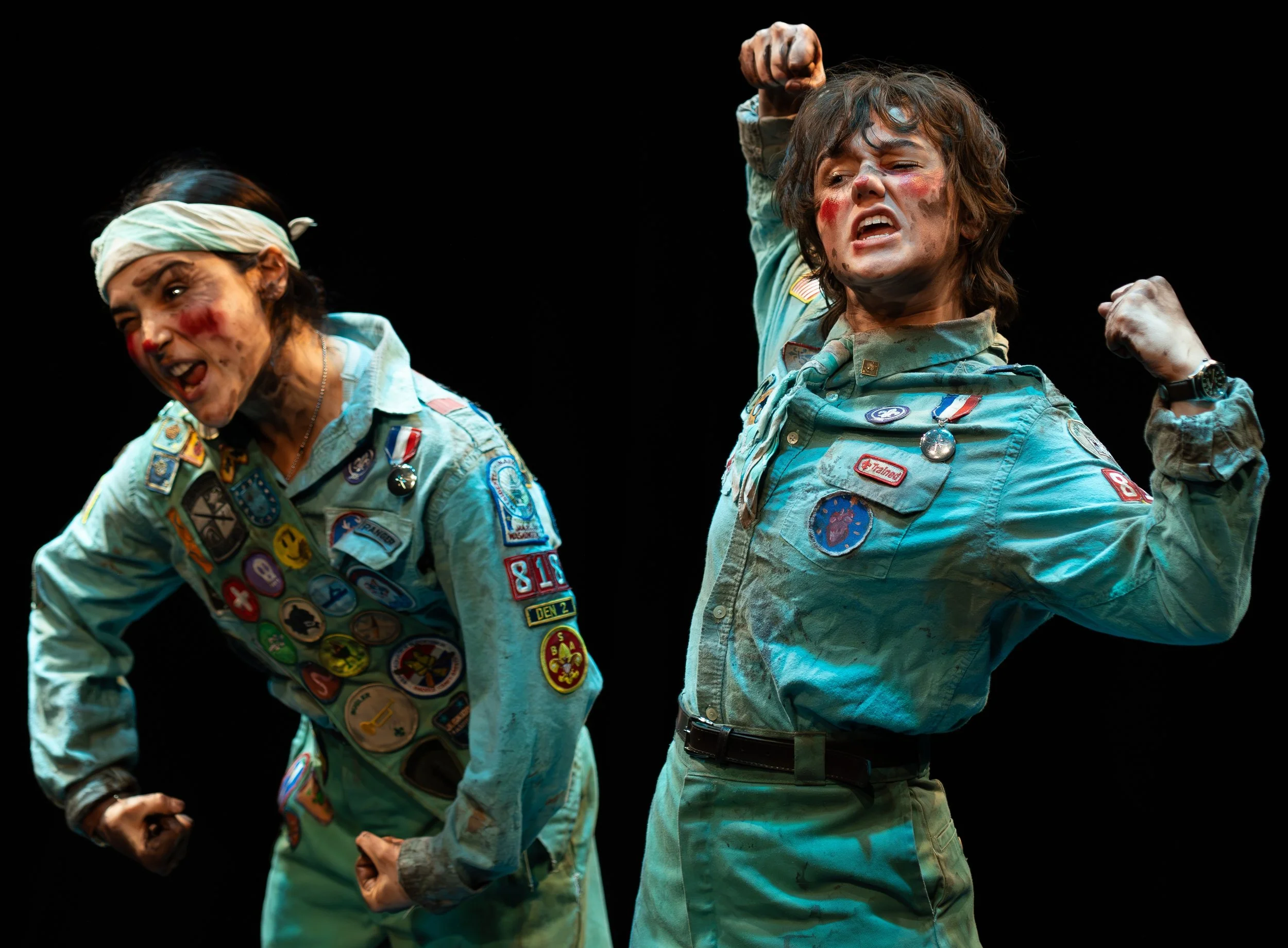Natasha Roland (left) plays Ace, and Xhloe Rice is Grasshopper in their absurdist two-hander A Letter to Lyndon B. Johnson or God: Whoever Reads This First.
In A Letter to Lyndon B. Johnson or God: Whoever Reads This First, playwright-directors Natasha Roland and Xhloe Rice blur the line between 1960s Boy Scout rituals and the drafting of U.S. soldiers to Vietnam. What emerges is an absurdist meditation on masculinity, obedience, and the perilous passage to manhood.
On entering the theater, audience members are invited to sit on stage or in the regular seats, creating a campfire atmosphere for all. The performance space is completely bare, except for a tire, which alternately serves as a bench, barricade, hoop to jump through, and more.
The two-hander follows two mud-smeared Boy Scouts, nicknamed Ace (Roland) and Grasshopper (Rice) as they grow up in small-town America. They love outdoor adventures like swinging on ropes and playing soldiers. They also have a spit handshake, which they won’t hold on for too long unless it’s “a really extreme situation.”
Ace and Grasshopper, of course, are competitive by nature—and both are in a hurry to become men. Given that they are Scouts, they tend to measure their maturity by the number of merit badges on their uniforms. Grasshopper is the first to admit that Ace outdoes him when it comes to badges, although he also realizes that Ace is a bit of a braggart:
Roland’s Ace (left) is a well-decorated Scout, and Rice is the meeker Grasshopper.
Grasshopper: Ace is real good at all this stuff.
Ace: I’m what they call “highly decorated.”
Grasshopper: You’re what they call “highly annoying.”
The play’s soundtrack is culled from Beatles’ tunes coinciding with the Johnson administrations (1963-69). But the music from “Ob-La-Di, Ob-La-Da,” without its lyrics, is recycled the most, with Roland and Rice musically embellishing it with superb harmonica playing. Beyond their musical expertise, the artists combine clowning, comic physicality, and a breakneck pace to tell their tale.
That the script cuts so sharply—and lands with such eerie emotional precision—is no coincidence. Roland and Rice both grew up in military families, a background that lends their writing a lived-in understanding of ritual, hierarchy, and duty.
President Johnson looms large in this two-hander—less as a politician than as a mythic father figure the two boys revere with near-religious fervor. For Ace, that distant hero becomes briefly tangible one October evening, when the 36th President’s train is scheduled to pass through his small town. At exactly 8:41 p.m., Ace sneaks out with his trombone, stationing himself beside the tracks. As the train whooshes by, he lifts the instrument and plays a solitary, heartfelt solo—an act of devotion aimed at a leader he may never meet, but desperately wants to be seen by.
Years pass by in quickly in this surreal piece, with Ace and Grasshopper transported from their backyards to summer camp in a blink. They mature somewhat there, quickly learning that there are consequences for putting worms in their counselor’s bed. They also expand the horizons of their make-believe world, pretending to be kings and knights, cops and robbers, soldiers, and even bad guys. Their make-believe games have an eerie way of bleeding into real life, however. Case in point: In the midst of one war game, when Ace and Grasshopper are crawling over the ground and protecting their supposed guns, Ace confides to Grasshopper that real war can get pretty dirty (“Mud gets in your mouth in war, my brother told me.”)
Creators and performers Roland (left) and Rice are two all-American boys in the Vietnam Ware era. Photographs by Morgan McDowell.
The strength of the play is in its childlike simplicity. Unlike other theater pieces on the Vietnam War, such as the musical Hair or David Rabe’s Vietnam War trilogy, this two-hander gets its powerful message across by portraying its protagonists as unwavering in their patriotism, even as the story veers into tragedy.
In one scene Grasshopper acts as Narrator while Ace inhabits all the characters who are going through their first week of basic training. Sadly, a skinny and timid boy with glasses introduced on Day One ends up as a full-blown tragedy on Day Five when he commits suicide. Severely shaken, Grasshopper and Ace then numbly recite a corrupted version of the Pledge of Allegiance:
Both. “Thy will be done, on Earth as it is in America. And to the republic for foreign sand, give us this day our daily dead . . .”
It’s worth noting that Roland and Rice made Edinburgh Fringe history last year by winning a Fringe First—the festival’s top honor—for the third consecutive year, for this Vietnam-themed play. A Letter to Lyndon B. Johnson or God: Whoever Reads This First truly packs an emotional punch. Attention should be paid.
Xhloe Rice and Natasha Roland’s A Letter to Lyndon B. Johnson or God: Whoever Reads This First plays through June 29 at SoHo Playhouse (15 Vandam St.). Evening performances are at 7 p.m. Wednesday through Saturday and 5 p.m. Sunday, with an added performance on June 28 at 4 p.m. For tickets and more information, visit sohoplayhouse.com.
Playwrighting & Direction: Xhloe Rice & Natasha Roland
Lighting and Technical Manager: Angelo Sagnelli





